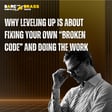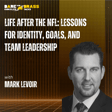
Why So Many Founders Fail at Talking About Their Own Product, with Elliot Volkman & Doug Landis!
Why are so many cybersecurity company founders so bad at talking about their own products?! This week we're joined by Elliot Volkman and Doug Landis to talk about how they used storytelling training to transform one company’s message to its customers!
In this episode:
🤦♂️ Why so many founders are terrible at talking about their own products
🎭 The power of storytelling vs. spewing facts and stats
💰 Why companies should invest in communication skills for operators, not just technical skills.
📊 Building trust through customer stories, not flashy banners
🗣️ Practical tips for nailing your next conference presentation
Tune in for some real talk on how to cut through the noise and actually connect with your audience. No BS, just straight advice.
—————————
🏔️We’re coming to SecureWorld Denver! Here are some exclusive discount codes:
BKBTSWC1 Conference Pass $50.00 Discount
BKBTSWO1 Open Sessions (Free)
BKBTSWP1 Plus Pass $75.00 Discount
🔥Want a little BKBT fire for your conference? Or maybe your GTM team needs a high-test dose of buyer insight at your next SKO! Drop us a line at bareknucklespod@gmail.com



















